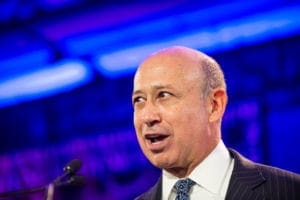Goldman Sachs’ CEO: Regulations Help Us Grow, Keeping Competitors at Bay
This article was featured in our weekly newsletter, the Liberator Online. To receive it in your inbox, sign up here.
Crony capitalism continues to expand big government’s grip, extending the realm under government’s control in ways we once thought impossible. As businesses and employees hurt due to government’s increasing control over all business fields, so does the economy.
 While this issue is inherently a government problem, big business has a lot to do with the growing regulatory burden. Instead of downplaying their role, libertarians should be pointing out how both parties are to blame, and how even big businesses understand this reality and often use it to their advantage.
While this issue is inherently a government problem, big business has a lot to do with the growing regulatory burden. Instead of downplaying their role, libertarians should be pointing out how both parties are to blame, and how even big businesses understand this reality and often use it to their advantage.
In a 2015 interview, Goldman Sachs’ CEO Lloyd Blankfein explained how regulations help to protect large, established firms, keeping smaller competitors from having access to the market.
In his own words, he gave the reporter an outline of what happens when a large firm like his is afraid of its competitors, and what’s funny is that few news outlets caught on to the CEO’s unabashed honesty, choosing to never reproduce his comments or downplay their importance.
When talking about how upstart tech companies and the threat they pose to Goldman, Blankfein said that while “all industries are being disrupted to some extent by new entrants coming in from technology,” regulations have been a friend of Goldman mostly because “there are some parts of [Goldman] business, where it’s very hard for outside entrants to come in, disrupt our business, simply because we’re so regulated.”
The burden of regulation, Blankfein added, is a serious issue for “people in our industry,” but, “in some cases,” Blankfein continued, “the burdensome regulation acts as a bit of a moat around our business.”
As you can see, Goldman Sachs’ own CEO refers to regulations as moats. In other words, the regulatory burden can be heavy and Goldman executives agree, but as long as the rules keep competitors from getting anywhere near the Goldman castle, the company doesn’t see a problem with complying.
According to Bill Anderson, a professor of economics at Frostburg State University in Frostburg, Maryland, America truly embraced regulations during the Progressive era, following the lead of progressive leaders such as Theodore Roosevelt, William Jennings Bryan, and Woodrow Wilson who believed that “the federal system of delegated powers was archaic and out of date for a ‘modern, progressive’ society.”
To these politicians, stripping “powers from state and local governments and transferring them to Washington, DC” and “convincing members of Congress to give up their own constitutionally-designated powers” were essential steps in making America a truly progressive nation. How did they manage to go about putting their plan in practice? By “crafting of regulatory agencies,” all of which are part of the executive branch.
So next time you see a Bernie Sanders or Hillary Clinton supporter go on and on about how government and big business should not be involved in any way, remind them of what has enabled this cozy relationship.

























